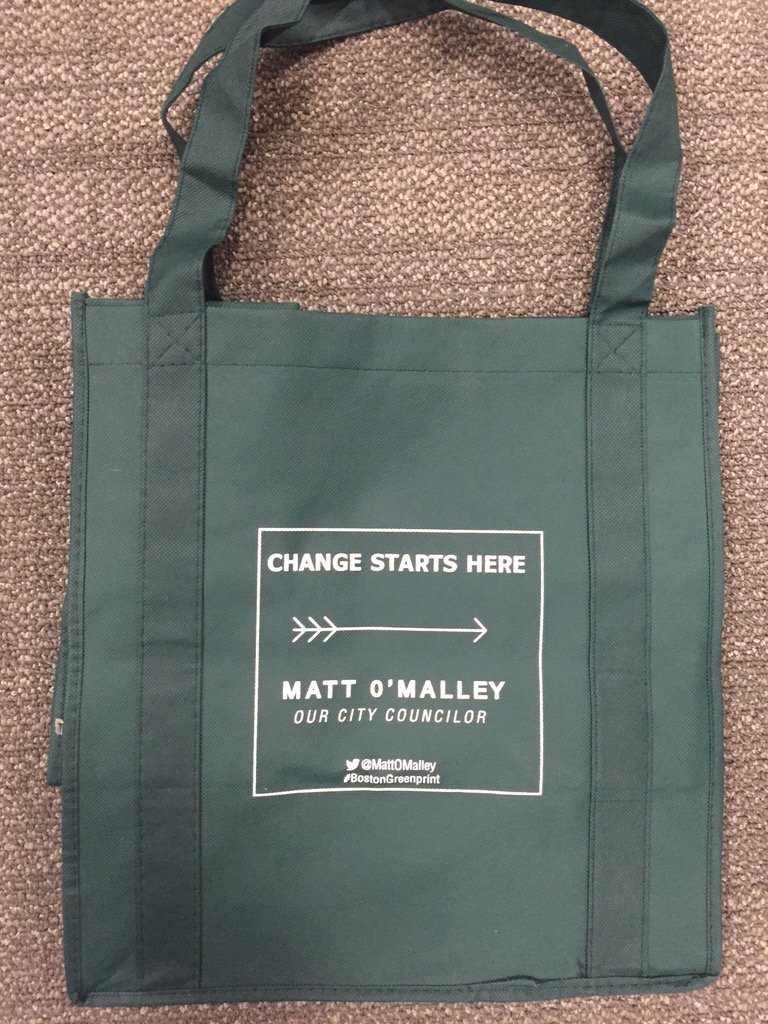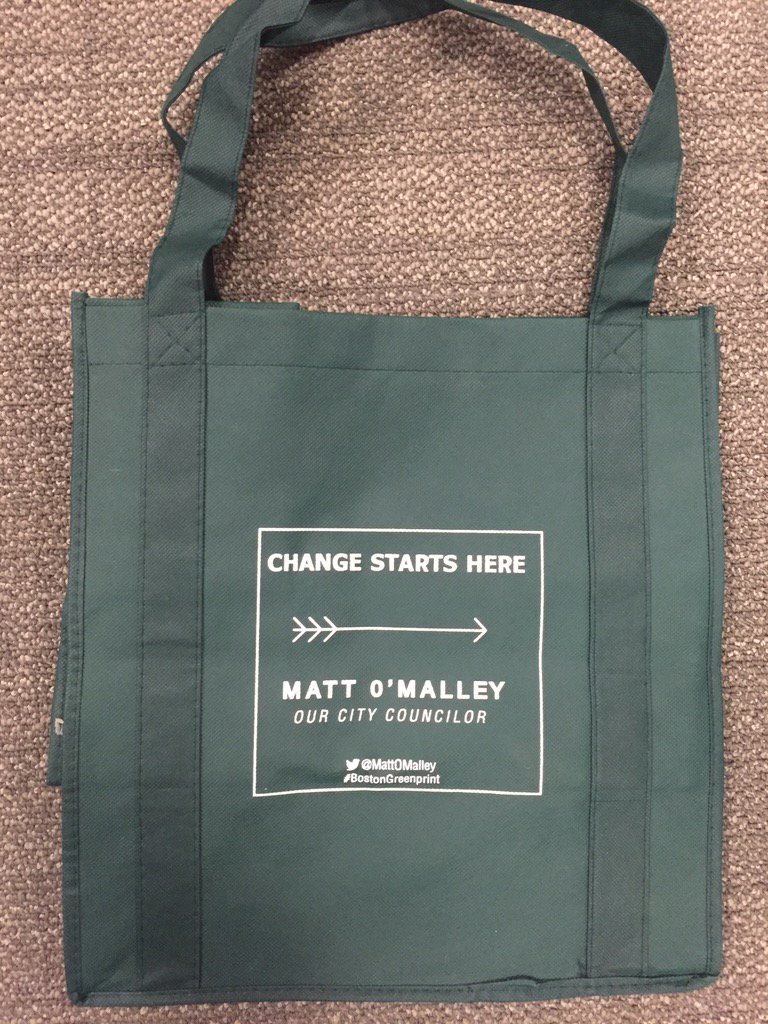
Banning plastic bags, protecting wetlands, fighting gas leaks, water-filling stations, sidewalk composting and net zero carbon buildings. There isn’t a Boston City Councilor who can lay claim to as many environmental legislative accomplishments and initiatives as Matt O’Malley.
All you need to do is tweet @MattOMalley to get a brand new reusable bag #bospoli pic.twitter.com/y5GNhwC0Id
— Jamaica Plain News (@02130News) February 28, 2018
O’Malley’s environmentally friendly legislation started during his first year on the council when he literally went after paychecks.
“Every other week I would get a pay stub even though I had direct pay,” said O’Malley, District 6’s City Councilor, who was first elected in 2010. “I hate paper and I hate clutter and I was raised as an environmentalist. I couldn’t opt out of getting a pay stub, which is a ridiculous policy to have.”
At first, O’Malley offered a resolution in support of not having to receive physical pay stubs. In the next round of budgeting, negotiations with the city’s human resources department led to employees being permitted to opting out of receiving paper pay stubs.
Next came water filling stations at Jamaica Pond. “I run a lot. Jamaica Pond is my oasis, and those single-use plastic water bottles strewn upon streets are infuriating to me,” said O’Malley.
The environmental impact of single-use plastic bottles versus tap water has been dissected by numerous studies. In the U.S. about 50 billion water bottles are used annually, which means 15-30 million barrels of oil are used (equivalent to fueling 100,000 to 2 million cars for one year) and 12 billion pounds of carbon monoxide, reported a Princeton University study.
“We should be stewards of our environment. We can also do it so it benefits the taxpayer and consumer. I’ve always been an environmentalist,” said O’Malley, who said he’s been pushed to create more environmentally friendly initiatives due to President Donald Trump. “[Trump is] a man who is a climate change denier…calling him a skeptic is too [lenient]… he’s dead wrong on all policies. He’s undone so much of the progressive agenda done by his predecessor, our real president Barack Obama. I feel like we have such an inept and antagonistic president, and the EPA leader follows suit. It’s up to cities, towns and states just because there’s a paucity of leadership at the federal level.”
Long before Trump became president and O’Malley graduated middle school, he was a young buy fashioning a stick with a magnet so he could retrieve aluminum cans from trash cans and turn them into bottle redemption centers. “Subconsciously I learned about good environmental stewardship, and also benefitted financially.”
For many people, municipalities and countries, cost savings tops environmentalism. O’Malley points to how China is now turning away recycling because it’s not as lucrative as a commodity when compared to making new plastic. That’s leading to some municipalities in the U.S. to stop recycling programs or reducing them.
“It underscores that as a city we need to build more recycling plants. The fact of the matter is that we are paying $82 to $86 per ton for garbage. For recycling we’re paying $5 to $7 dollars per ton. It’s not creating a profit like when we would make money, but it’s still significantly better than trash. We’re all going to save money,” said O’Malley.
For several years O’Malley has put forth legislation to create a sidewalk compost program for the city. So far it has not become law, but O’Malley isn’t going to give up, and would like to start a pilot program in Jamaica Plain because he knows many JP residents would participate and provide great insight into what works and what doesn’t work. O’Malley also worked with J.P. Licks in 2018 for a unique composting initiative, as the ice cream business began giving away free coffee grounds, which are great for fertilization of plants.
Today I joined Vince Petryk, owner of @jplicks, to announce a wonderful new sustainability initiative. Starting 12/27, people can pick up free coffee grounds for composting/fertilization. Limited supply, Tues & Thurs only, beginning at the flagship JP store. #BostonGreenprint pic.twitter.com/rfZjS5A1PD
— Matt O’Malley (@MattOMalley) December 21, 2018
One of O’Malley’s biggest environmental accomplishments was his plastic bag ordinance that requires any bag provided by a retail business to a customer must be a reusable bag, a recyclable paper bag or a compostable plastic bag. The ordinance was also co-sponsored by At-Large City Councilor Michelle Wu and is reducing litter on the streets, preventing plastic bags from ending up in our waterways, in trees and harming the environment. Using fewer plastic bags also reduces greenhouse gas emissions and solid waste, while promoting the use of recyclable bags.
Day 1 of the #BYOBagBOS is nearly in the books. Incredibly grateful for the partnership w/@wutrain, unanimous vote from colleagues & leadership of @marty_walsh. Residents will now see fewer bags caught in trees & storm drains & the positive environmental impact has already begun. pic.twitter.com/zFoMaaLixf
— Matt O’Malley (@MattOMalley) December 15, 2018
“I think the change [of opinion] on environmentalism and sustainability is from seeing the threat of climate change, and a desire to act on climate change is one of the fastest growing movements,” said O’Malley. He added that support of environmental justice has grown greatly in recent years as people have witnessed more extreme weather patterns while suffering through several of the hottest years ever recorded.
“We used to say we had to act for our kids and grandkids [now it’s for us]. At the UN Climate Change Panel they said we’ve got 12 year to make it right and know it and now we have to act,” said O’Malley.
Always great catching up with the Jamaica Plain Neighborhood Council. Thanks for having me on tonight’s agenda to discuss: #NetZeroCarbon, #BostonGreenprint, development, trash & recycling, traffic, safety & more. #bospoli #mapoli pic.twitter.com/tacuesuFLf
— Matt O’Malley (@MattOMalley) March 27, 2019
O’Malley’s latest environmental initiative is helping Boston reach its stated goal of being carbon neutral by 2050.
“Net zero carbon is a notion we build as net carbon zero as much as possible. These are buildings that use and produce the same amount of energy,” said O’Malley. “How do we do that? Through onsite renewable energy, offsite credits for solar, wind or hydro.”
The largest factor is that buildings produce about 70 percent of greenhouses gases in Boston. O’Malley said 80 percent of the buildings that will be here in 2050 already exist, means that new developments should be net zero carbon.
“How do we do that? I’ve been pushing every development to be net zero, they don’t use gas, don’t use fossil fuels, all electrical, onsite solar, thicker walls that act as a thermal effect,” said O’Malley.
Whether it’s new construction, composting, plastic bags, water stations, or any other environmental initiative O’Malley goes after, for him it’s not about political parties.
“Every fiscal conservative should be an environmentalist. Sound environmental policy saves money if you do it well,” said O’Malley.

